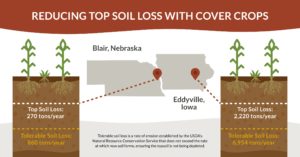
Reducing emissions and soil erosion in the first year of HSBC grant
The Midwest Row Crop Collaborative’s relationship with HSBC Bank USA is aiding the expansion of regenerative agriculture in the Midwest. HSBC is financially supporting five MRCC member-led projects that address system challenges and develop scalable solutions to support a more resilient landscape and food and agricultural system.
With year one of the grant funding wrapped up, much progress has already been made in supporting farmers and scaling the adoption of climate-smart practices. Updates on how HSBC funds have aided the projects are highlighted below.
“With the support from HSBC, we’re able to test new ways of scaling regenerative agriculture in the Midwest. What’s great about this partnership is that we’re learning from on-the-ground pilots, and then sharing those lessons back to farmers, partners, and a whole network of colleagues around the world in the HSBC Nature-Based Solutions Accelerator,” said Ariel Kagan, director of agriculture strategy for Environmental Initiative, administrator of MRCC.
Reducing loss of topsoil in Iowa and Nebraska
MRCC members PepsiCo, Bayer, and Cargill, in partnership with Practical Farmers of Iowa, are encouraging more farmers to add small grains and legumes as cover crops into corn and soybean rotations. Farmers in the program are planting barley, spring wheat, triticale, winter wheat, cereal rye, hybrid rye, and oats.
Three farmers near Blair, Nebraska, and 14 farmers near Eddyville, Iowa, were paid for planting small grains in the 2021 growing season. Eleven of these farmers used no-tillage in their small grain and five farmers did not apply any fertilizer.
These practices have already reduced the loss of topsoil, a vital resource that has eroded by more than 50 billion tons in the Midwest since farmers began tilling the land 160 years ago, according to a recent study. The soil erosion in the first year on the participating farms was about 70% less than the non-degrading level of soil erosion, or tolerable soil loss. This is a rate of erosion established by the USDA’s Natural Resource Conservation Service that does not exceed the rate at which new soil forms, ensuring the topsoil is not being depleted. Near Blair, the average soil loss was at 270 tons/year compared to the tolerable soil loss of 860 tons/year. In Eddyville, the average soil loss was about 2,220 tons/year compared to the tolerable soil loss of 6,954 tons/year.

In a survey, all the participants in this program said they were somewhat or very likely to recommend this program to other farmers. One stated, “from what I have been involved in they helped by giving me an extra incentive to practice the small grain route. My farm needed an extra boost from the small grain crop to help heal the soil.”
The program continues to expand after the first year — with 47 farmers enrolled in the programs in Blair and Eddyville for the 2022 growing season, planting about 5,500 acres of small grains.
Reaching more farmers
The Precision Conservation Management (PCM) program of the Illinois Corn Growers Association works to improve water quality while ensuring farmers benefit from the positive conservation outcomes. PCM does this by paying farmers to plant cover crops.
Funding from HSBC for this project is matched by Cargill, PepsiCo, Illinois Corn Growers Association, and the Illinois Soybean Association. The additional support helped expand the cover crop cost-share program into a new region, enabling more farmers to receive financial support for planting cover crops and improving soil health.
By the end of July this year, there were already 22 farmers and roughly 20,000 acres enrolled in the new area. At that time, five of the farmers had planted 2,712 acres of cover crops. They had also reduced nitrogen fertilizer application on 628 acres and adopted no-till practices on about 1,000 acres.
“The aid from HSBC reduces the economic risk farmers would otherwise face from adding cover crops to their rotations,” said Clay Bass, PCM operations manager. “We can support the resiliency of the land and agriculture system while putting farmers first.”
Adding a new crop to the portfolio
The Nature Conservancy and Kellogg Company are developing a Pay-for-Performance (PfP) program for farmers in Michigan’s Saginaw Bay watershed growing sustainable wheat, a new crop in the Midwest Row Crop Collaborative’s project portfolio. The goal of the program is to eliminate the need for third-party entities to provide incentives and verification and to show the benefits of conservation practices.
The partners are working with grain processing partner Star of the West Milling Company to house the new Sustainable Wheat program within the supply chain. TNC and Star of the West are holding ongoing meetings to build this program and better understand the roles and duties to be performed, drawing on lessons learned from TNC’s current PfP partnership with Kellogg Company and other incentives programs. Both partners are conducting on-site farmer visits with potential program participants this winter.
Going into the second year, TNC will collaborate with Star of the West to train field staff and help them become better acquainted with the in-field conservation practices through an on-site training and mentoring program. The partners are recruiting the first group of participant farmers and are establishing a farmer-led group to provide peer-to-peer support for participating farmers.
Customer-led incentives
MRCC members Kellogg Company and The Nature Conservancy partnered with Saving Tomorrow’s Agricultural Resources (STAR) staff to develop a model and process to incentivize growers to expand conservation on their land and better understand the soil and water quality impacts of their management practices.
STAR leadership developed an engagement guide, the STAR model, to help companies incentivize growers to implement climate-smart practices through a Pay for Performance (PfP) program. The model was made public through a pilot program in two Illinois counties in February and visibility has been high. The cooperating merchandiser has notified about 700 producers of the opportunity, mostly through emails and text messages.
“Kellogg Company is committed to supporting farmers through our Better Days Promise ESG strategy. Proving the financial benefit of these practices through the Pay-for-Performance program helps ensure farmers receive adequate pay for implementing these practices,” said Emily O’Halloran, responsible sourcing lead, North America, for Kellogg Company. “With the HSBC grant, we can break down some of the barriers farmers face to adopt regenerative practices.”
Much progress has been made already in expanding projects that create a more resilient landscape and food and agricultural system during the first year of HSBC funding. There have been measurable positive impacts on the environment, including reduced greenhouse gas emissions and soil health as more farmers and acres adopt conservation practices through these programs. There is still much that needs to be done, but MRCC members and partners are taking steps in the right direction thanks to HSBC’s support.